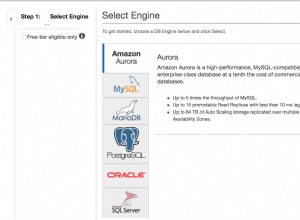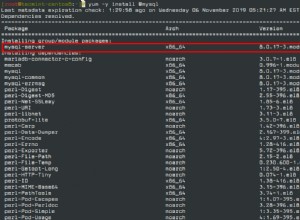Prima di tutto, non usare OleDb , periodo. Microsoft ti dice di utilizzare un provider specifico del fornitore. Usa ODP.NET di Oracle.
In secondo luogo, per recuperare il recordset da Oracle SP, è necessario restituire refCursor .
Modifica: In questo momento sappiamo che i tuoi parametri sono tabelle. Per elaborarlo è necessario aggiungere p.CollectionType = OracleCollectionType.PLSQLAssociativeArray ai tuoi parametri
Il tuo codice è essenzialmente questo:
Declare
obus_grp_id PKG_HOBS.Tnumber; -- numeric table value
ostat_c PKG_HOBS.Tnumber; -- numeric table value
ostat_msg_x PKG_HOBS.Tmsg_500; -- string table value
BEGIN
PKG_HOBS.PRC_HOBS_GET_CLIENTID(obus_grp_id, ostat_c, ostat_msg_x);
END;
Ti vedo eseguire il blocco anonimo:non è necessario farlo poiché questo ti complica le cose. Quello che devi fare è usare vb.net per eseguire il pacchetto direttamente.
Linea inferiore: il tuo attuale codice ORACLE non fa nulla per produrre risultati in .NET. Rimuovi il blocco anonimo e sei in affari.
Ecco il codice per elaborare il tuo tipo di procedura (leggi nei commenti)
Dim cmd As New OracleCommand("PKG_HOBS.PRC_HOBS_GET_CLIENTID", conn)
cmd.CommandType = CommandType.StoredProcedure
Dim p1 As New OracleParameter(":p1", OracleDbType.Int64, ParameterDirection.Output)
p1.CollectionType = OracleCollectionType.PLSQLAssociativeArray
p1.Size = 100 ' Declare more than you expect
' This line below is not needed for numeric types (date too???)
' p1.ArrayBindSize = New Integer(99) {}
cmd.Parameters.Add(p1)
' Add parameter 2 here - same as 1
Dim p3 As New OracleParameter(":p3", OracleDbType.Varchar2, ParameterDirection.Output)
p3.CollectionType = OracleCollectionType.PLSQLAssociativeArray
p3.Size = 100 ' Declare more than you expect
' for string data types you need to allocate space for each element
p3.ArrayBindSize = Enumerable.Repeat(500, 100).ToArray() ' get 100 elements of 500 - size of returning string
' I don't know why you have problems referencing System.Linq but if you do...
'Dim intA() As Integer = New Integer(99) {}
'For i as integer = 0 to intA.Length -1
' intA(i) = 500
'Next
cmd.Parameters.Add(p3)
conn.Open()
cmd.ExecuteNonQuery()
' Ora number is not compatible to .net types. for example integer is something
' between number(9) and (10). So, if number(10) is the type - you get Long in
' return. Therefore use "Convert"
' Also, you return arrays, so you need to process them as arrays - NOTE CHANGES
Dim oraNumbers() As OracleDecimal = CType(p1.Value, OracleDecimal())
Dim myP1Values(oraNumbers.Length - 1) As Long
For i as Integer = 0 To oraNumbers.Length - 1
myP1Values(i) = Convert.ToInt64(oraNumbers(i).Value)
Next
oraNumbers = CType(p2.Value, OracleDecimal())
Dim myP2Values(oraNumbers.Length - 1) As Long
For i as Integer = 0 To oraNumbers.Length - 1
myP2Values(i) = Convert.ToInt64(oraNumbers(i).Value)
Next
Dim oraStrings() As OracleString= CType(p3.Value, OracleString())
Dim myP3Values(oraStrings.Length - 1) As String
For i as Integer = 0 To oraStrings.Length - 1
myP3Values(i) = oraStrings(i).Value
Next
E questa è la parte più importante
La parte più importante è come riempi il tuo tipo dichiarato. Prendiamo
TYPE Tnumber IS TABLE OF NUMBER INDEX BY BINARY_INTEGER;
v_num Tnumber;
v_num(1) := 1234567890;
v_num(2) := 2345678901;
v_num(3) := 3456789012;
Questo (sopra) funzionerà. Ma questo fallirà:
v_num(0) := 1234567890;
v_num(1) := 2345678901;
v_num(2) := 3456789012;
E infine, questo funzionerà con una condizione
v_num(2) := 1234567890;
v_num(3) := 2345678901;
v_num(4) := 3456789012;
Qui otterremo 4 membri in p1.Value ma sotto l'indice 0 avrai oracle null . Quindi, dovresti affrontarlo qui (se hai una tale condizione)
' instead of this
myP2Values(i) = Convert.ToInt64(oraNumbers(i).Value)
' you will need first to check
If oraNumbers(i).IsNull Then
. . . .
Quindi, la cosa principale qui è, QUAL è l'indice della tua tabella pl/sql?! Deve iniziare da qualcosa di più grande di 0 e preferibilmente da 1 . E se hai un indice con numeri saltati, ad esempio 2,4,6,8 , tutti quegli spazi faranno parte dell'array Oracle restituito e ci sarà oracle null in essi
Ecco qualche riferimento




